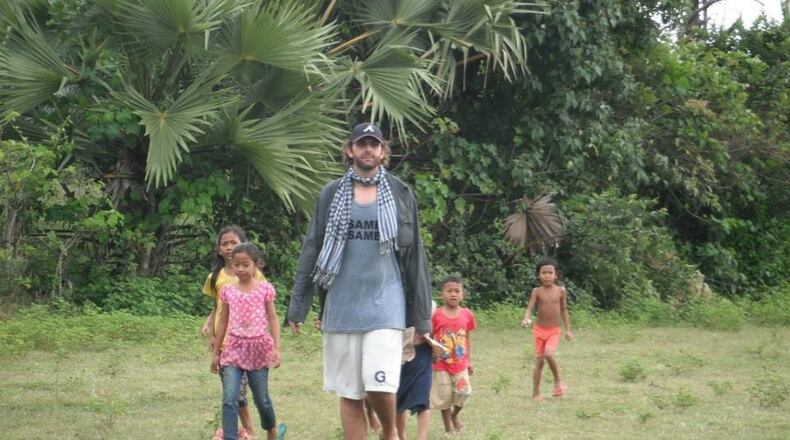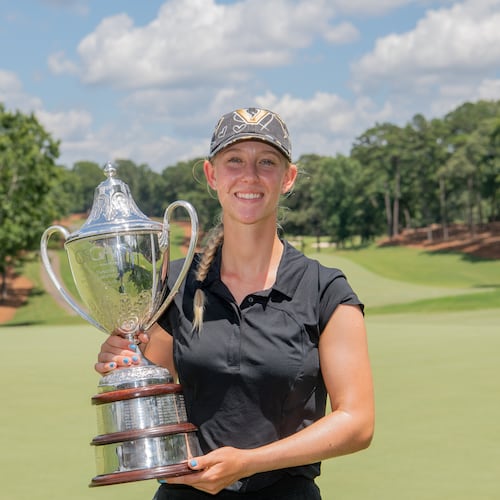South Gwinnett High coach Tysor Anderson has basketball in his blood. How can he not, with Lefty Driesell, the legendary coach for Davidson, Maryland, James Madison and Georgia State, as his grandfather?
Anderson was going to his granddad’s basketball camps at James Madison by the age of 5. When he was 7, he tagged along on a two-game road trip. Anderson was sitting in the stands when Kent Culuko made the 3-pointer to send the Dukes to the 1994 NCAA tournament, as vivid a memory as any from his childhood.
Even as a ball boy, Anderson already knew. He was going to be a coach, just like granddad.
“Granddad was larger than life to me,” Anderson said. “And all I wanted to do was be like him.”
A year after college Anderson had the pedigree, the resume, and was in line for a job as an assistant coach at Lee University, a Division II school in Tennessee. Anderson had spent three years as a walk-on under Paul Hewitt at Georgia Tech and one as a student assistant. He’d gotten some experience as an assistant coach at Waycross Junior College. Then he flinched.
His path might have seemed so clear. It makes so much sense now that he’s taken South Gwinnett from five wins last season to 14 wins and a berth in next week’s state tournament in his first season as head coach. The Comets (14-9) beat Archer 67-62 in the regional tournament Wednesday to clinch a spot. But Anderson decided to leave his future up to chance. Basketball was going to have to choose him.
Anderson is a deep thinker. His mother, Pam Driesell, is the senior pastor at Trinity Presbyterian in Atlanta. And his father, David Anderson, is a psychotherapist, who used to work as a counselor at South Gwinnett. Wrestling with existential questions is as much a part of Anderson’s nature as diagramming inbounds plays.
Standing at the precipice of a coaching career, Anderson applied to the Peace Corps.
“I had an itch to get out,” he said.
His plan was to go with whoever offered first — the Peace Corps or Lee, at least that’s what he told family and friends. In reality, Anderson had a secret.
“I was madly in love with a woman in Seattle, and we were planning to run away,” Anderson said. “We were going (to) work on a coffee farm in Hawaii.”
The Peace Corps invitation came in the mail the day before Lee called with an offer. So the Peace Corps became his cover. But about a week before he was supposed to go to Cambodia, as he was gearing up to break the news to his family that he was turning down the Peace Corps, he and his girlfriend broke up.
“I’ve never told that to anybody except my mom and my brother,” Anderson said. “Anybody who’s loved and lost knows that hurt. The best thing for me to do was just to get as far away as possible. And luckily I already had the ticket.”
Anderson took refuge 9,000 miles away in a remote village on the foothills of the Cardamom Mountains. Food and running water were scarce, and the only person who could speak some broken English was a tutor assigned to help him learn Khmer, the Cambodian language.
Anderson’s job was to teach villagers about nutrition. They taught him about hardships he’d never fathomed, like the lasting impact of genocide. As many as 3 million Cambodians were killed under the Khmer Rouge regime in the 1970s.
“In Cambodia, (it’s) in the fiber of everything that happens and everybody that’s there,” Anderson said. “The sadness that you see in people’s eyes sometimes. … It’s much deeper than anything I can ever comprehend.”
The school director where Anderson taught had always been stoic. She showed him little desire to engage. That all changed the day he relayed plans to her, through his tutor, to help build a soccer field as his last project before leaving for the United States. Soccer is the most popular sport in Cambodia, he figured. She seemed pleased, he said, but not overwhelmed. Then she turned back to the tutor and said something in Khmer. The tutor told him: She said she’d rather have a basketball court.
“I hadn’t heard or seen anything about basketball since being there,” Anderson said. “With him translating, she and I started to have a talk about basketball, and it was the most life I’d seen in her since I met her. All of a sudden she was enchanted. She was telling me how she grew up playing basketball.”
She had played since she was 3. Her uncle, who had been on the Cambodian national team, taught her. She diagrammed a tip play on Anderson’s notebook they ran for her in high school. Then she went to a cabinet and pulled out a deflated basketball. She starting demonstrating her pivot foot and the finer points of a chest pass.
“This woman was almost completely lifeless during every encounter we have shared over the last couple months and then out of nowhere, she is Cheryl Miller,” Anderson wrote in a letter home, asking friends and family for donations. “I guess I have no choice but to build her a basketball court.”
He and students poured the concrete themselves. He wrote out dimensions and took them to town, where a woodworker created backboards and a metal worker the rims. His mother mailed basketballs and a net from the U.S. Anderson said he marveled the day he watched the school director shoot baskets out on the court with kids watching her, all of them wide-eyed.
“I didn’t know what I was going to do when I came back (to the U.S.),” Anderson said. “I did know that I missed basketball a lot.”
He took an assistant coaching job at North Georgia College when he got back in 2014 and South Gwinnett called last July. Anderson debated going there or taking an assistant’s job at Jacksonville State. He turned to Driesell, who built his reputation on speaking his mind, and that applies to his grandsons as well.
“He said, ‘I don’t know what you got to think about Ty, you don’t even know if you can coach,’” Anderson said. “These people are crazy enough to think you can coach. You might as well go do it.”
Driesell started his coaching career at Granby High in Norfolk, Va. At 85, he doesn’t travel much anymore, but he and Anderson talk on the phone often. When Anderson was nervous about earning his new players’ trust, Driesell told him to earn their hard work by showing them hard work. Anderson followed in Driesell’s footsteps by focusing on defense in his first four or five practices. He uses what he learned from both Driesell and the Peace Corps about relationship building.
“When I first got to Cambodia I didn’t speak any of their language, and by the time I left, we were crying together,” Anderson said. “Coming here is not altogether that different.”
About the Author
Keep Reading
The Latest
Featured



